In the vibrant tech landscape of Sydney, where innovation pulses through hubs like Stone & Chalk and the Sydney Startup Hub, business owners and executives are at a crossroads. The choice? Cling to generic, off-the-shelf software that promises convenience but often delivers frustration, or embrace customised solutions that truly align with your organisation's unique needs. As Australia's leading custom software, apps, integration, and database developer, C9 has been at the forefront of this transformation, helping countless Sydney-based businesses in industries such as finance and retail make the switch.
According to the Australian Bureau of Statistics (ABS), Sydney's economy is booming, with the tech sector contributing over $100 billion annually to New South Wales' GDP as of 2023. This growth is fuelled by a surge in startups—over 2,500 in Sydney alone, many nurtured in collaborative spaces like Stone & Chalk, which has supported more than 200 ventures since its inception. Yet, amidst this expansion, executives are realising that standardised tools simply can't keep pace. They're rigid, expensive to maintain, and ill-suited to Australia's regulatory environment, such as the stringent requirements of the Australian Prudential Regulation Authority (APRA) for finance firms.
In this comprehensive guide, we'll delve into the reasons behind this shift, backed by real-world data and expert insights. We'll explore the benefits of custom software—focusing on cost savings and scalability—while addressing key processes like discovery calls and the dangers of hasty pricing. If you're a Sydney executive looking to optimise your operations, this blog will equip you with the knowledge to make informed decisions. Let's uncover how custom software development is not just a trend, but a strategic imperative for long-term success.
The Shift from Off-the-Shelf Tools to Custom Software: A Sydney Story
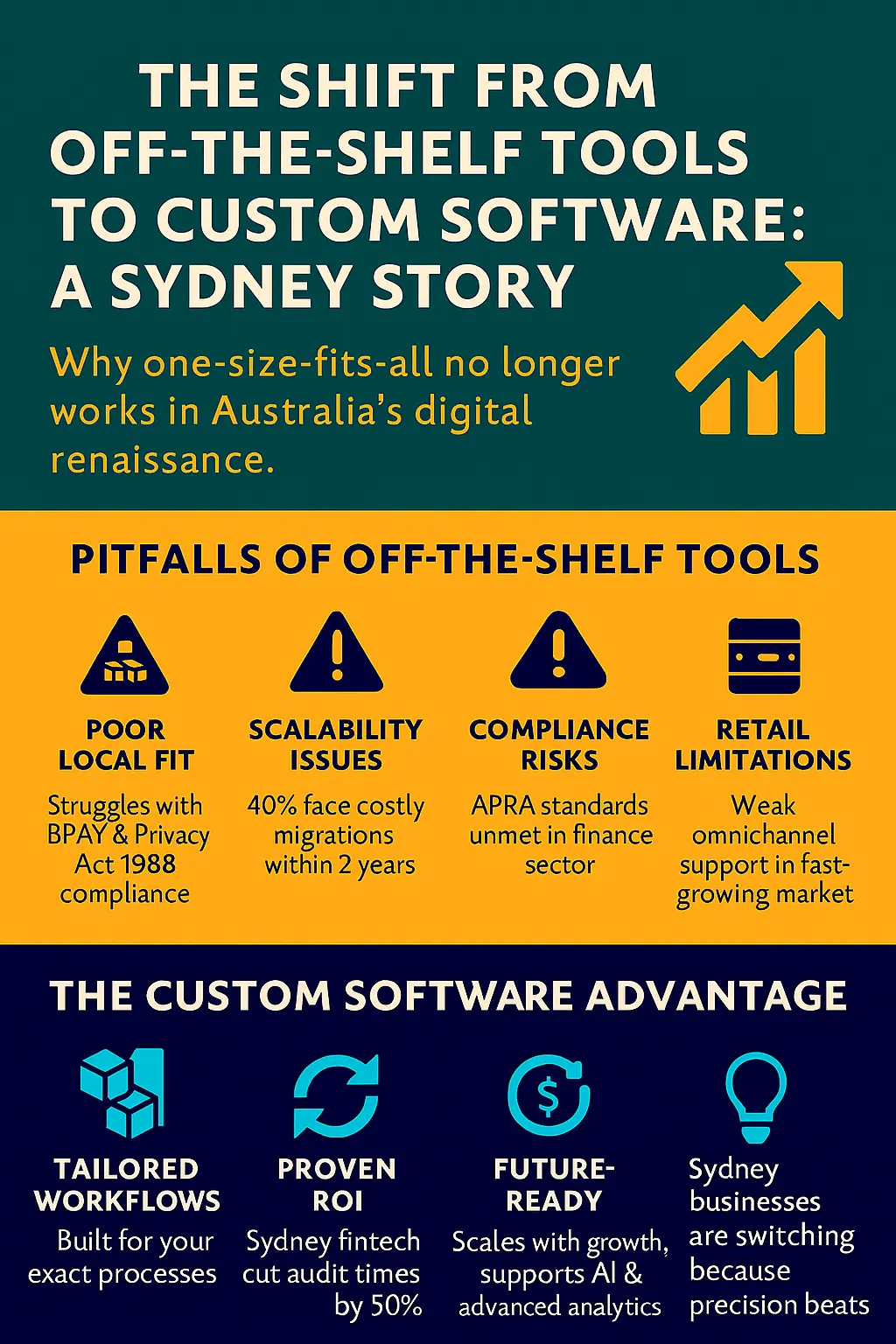
Sydney's business ecosystem is undergoing a digital renaissance. The city's startup scene has exploded, with a 30% increase in tech ventures between 2020 and 2023, according to NSW Government reports. Hubs like Stone & Chalk, located in the heart of Sydney's Tech Central precinct, are at the epicentre, providing mentorship, funding, and networking to innovators. This environment demands agility, yet many organisations are still shackled by off-the-shelf software—pre-packaged tools like generic CRM systems or inventory management platforms that were never designed for the nuances of Australian markets.
Consider the drawbacks of these off-the-shelf solutions. They often require extensive workarounds to fit local needs, such as integrating with Australian payment gateways like BPAY or complying with the Privacy Act 1988. A Gartner report from 2023 highlights that 40% of businesses using standardised software experience scalability issues within two years, leading to costly migrations. In Sydney's finance sector, where firms handle sensitive data under APRA guidelines, generic tools can expose organisations to compliance risks. Retail executives, meanwhile, grapple with tools that fail to support omnichannel strategies—crucial in a city where e-commerce grew by 25% post-COVID, per ABS data.
This is where the shift to custom software development shines. Tailored solutions are built from the ground up, incorporating your specific workflows, integrations, and growth trajectories. At C9, we've seen this firsthand: A Sydney fintech startup, for instance, transitioned from a clunky off-the-shelf accounting platform to a custom database system that automated compliance reporting, reducing audit times by 50%. The trend is clear—Sydney businesses are switching because custom software offers precision in a market where one-size-fits-all simply doesn't cut it. With Stone & Chalk fostering collaborations that prioritise innovation, executives are leveraging custom development to stay ahead of competitors, both locally and globally.
Cost Savings, Scalability, and Industry-Specific Advantages
The allure of custom software lies in its tangible, measurable benefits. Let's break them down, supported by industry facts and Sydney-centric examples.
Beyond the Initial Investment
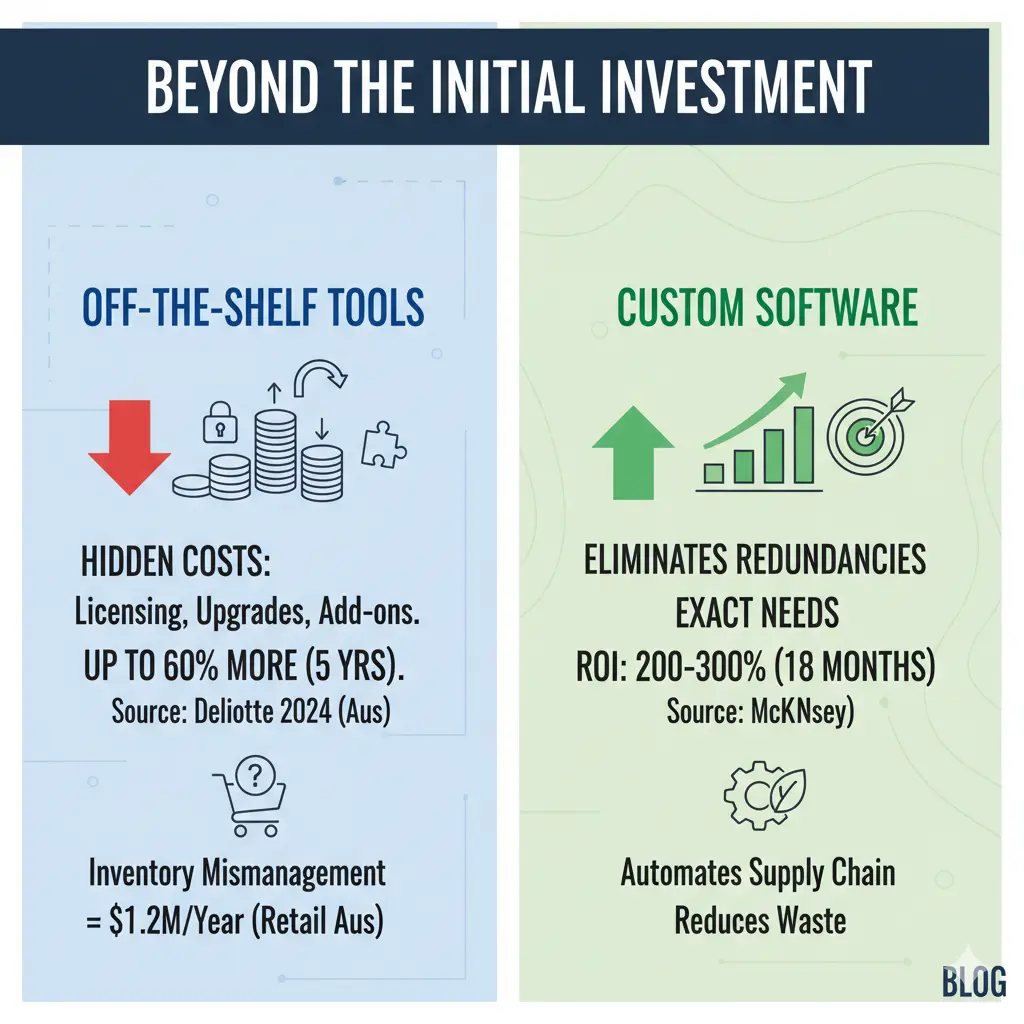
Off-the-shelf tools might seem cheaper upfront, but they accumulate hidden costs. Licensing fees, mandatory upgrades, and third-party add-ons can inflate expenses by up to 60% over five years, according to a 2024 Deloitte study on Australian enterprises. Custom software flips this script by eliminating redundancies. For Sydney retail chains, where inventory mismanagement costs an average of $1.2 million annually (per Retail Council of Australia data), a bespoke system can automate supply chain predictions, slashing waste.
Custom development focuses on your exact needs, avoiding the bloat of unnecessary features. In the long run, this translates to a return on investment (ROI) of 200-300% within 18 months, as reported by McKinsey for custom tech projects.
Unmatched Scalability for Sydney's Growth
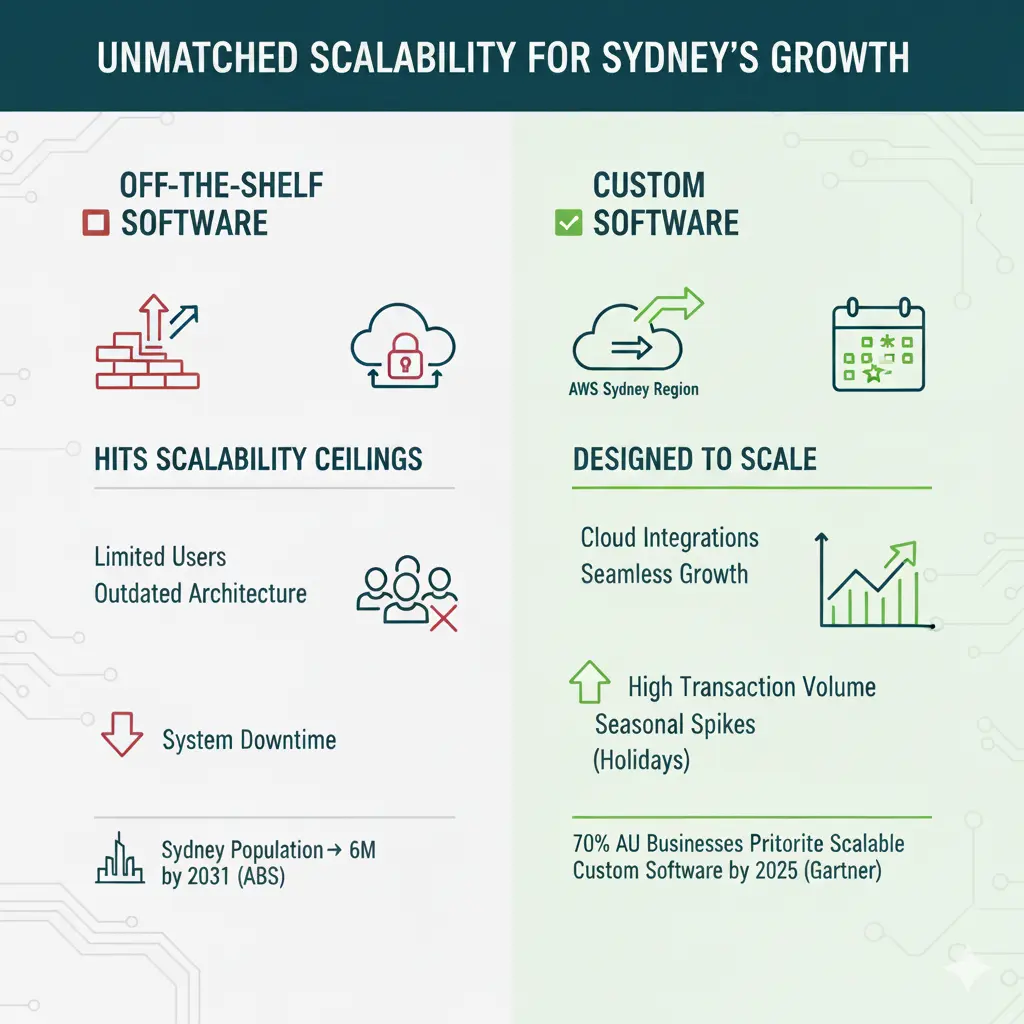
Scalability is non-negotiable in Sydney's dynamic market. With the city's population projected to reach 6 million by 2031 (ABS forecasts), businesses must expand without friction. Off-the-shelf software often hits ceilings—think limited user capacities or outdated architectures. Custom solutions, however, are designed to scale: They can incorporate cloud integrations with providers like AWS Sydney Region, ensuring seamless growth.
For finance executives, this means systems that handle increasing transaction volumes without downtime. Retail businesses benefit similarly, with custom apps adapting to seasonal spikes—like Sydney's busy holiday shopping period—without performance lags. Gartner predicts that by 2025, 70% of Australian enterprises will prioritise scalable custom software to support hybrid work models, a trend already evident in Sydney's corporate hubs.
Industry-Specific Advantages for Finance and Retail
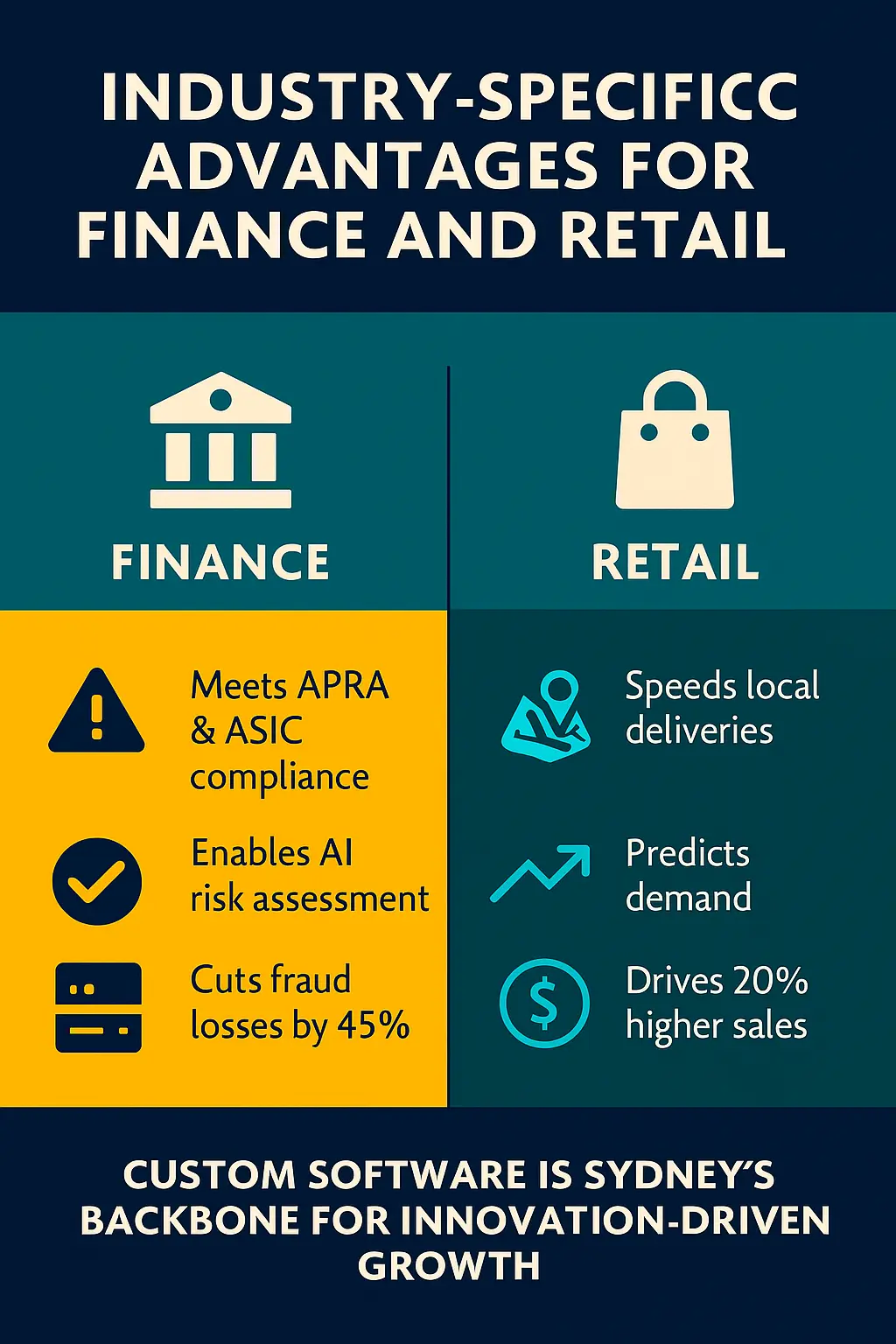
Custom software excels by addressing sector-specific challenges. In finance, where Sydney hosts major players like the big four banks, tailored solutions ensure compliance with APRA and ASIC regulations while enabling advanced features like AI-driven risk assessment. A 2023 PwC report notes that custom fintech tools have reduced fraud losses by 45% for Australian firms.
For retail, custom development powers personalised experiences, such as apps integrating with local logistics like Australia Post for faster deliveries. In Sydney's competitive retail landscape—where foot traffic in areas like Pitt Street Mall combines with online sales—custom inventory systems can predict demand using local data trends, boosting sales by up to 20% (per ABS retail statistics). At C9, our integrations and database expertise have helped retail executives create seamless ecosystems, from point-of-sale to e-commerce, driving customer loyalty and revenue.
These benefits aren't abstract; they're proven in Sydney's ecosystem, where custom software is becoming the backbone of innovation-driven growth.
The Critical Role of Discovery Calls: Don't Skip This Step
Before committing to any custom software project, a discovery call is essential. Skipping it? That's one of the worst decisions a Sydney executive could make—it sets the stage for miscommunication, budget blowouts, and suboptimal outcomes.
Discovery calls bridge the gap between your business vision and technical reality. They reveal underlying needs, potential challenges, and innovation opportunities that surface-level discussions miss. In Sydney's fast-paced environment, where executives juggle multiple priorities, this step ensures your investment yields maximum value. According to a Harvard Business Review analysis, projects with thorough initial assessments are 28% more likely to succeed on time and within budget. At C9, we've observed that clients who engage in discovery realise 15-20% higher ROI, as it aligns software with strategic goals like compliance in finance or inventory optimisation in retail.
How Discovery Calls Work: A Step-by-Step Breakdown
Discovery isn't a vague chat; it's a structured process that respects your time, typically lasting 30-60 minutes. Here's how it unfolds at C9, tailored for busy Sydney professionals:
Initial Alignment (5-10 minutes): We start by understanding your organisation's goals, current pain points, and industry context—such as APRA compliance for finance or omnichannel needs for retail in Sydney.
Deep Dive into Requirements (15-20 minutes): We explore your existing systems, user workflows, and desired features. For example, we might ask, "How does your team manage peak-hour inventory in a Sydney warehouse?" to identify custom integration opportunities.
Technical Feasibility and Brainstorming (10-15 minutes): Our experts outline high-level solutions, potential tech stacks (e.g., integrating with Sydney-based cloud services), and risks, providing early insights without commitments.
Actionable Next Steps (5 minutes): We summarise findings and propose a roadmap, emphasising staged development for quick wins.
This process isn't a waste of time—it's an efficiency booster. It prevents costly revisions, with studies from the Project Management Institute showing that poor requirements gathering causes 40% of project failures. For Sydney executives, it's like conducting due diligence before a major investment: Essential for minimising risks in a competitive market.
Why Skipping Discovery Is a Recipe for Disaster
Rushing past discovery leads to assumptions that haunt projects later. We've seen Sydney clients face scope creep, where unaddressed needs add 20-50% to costs. Without it, you risk building software that's "almost right" but misses key elements, like mobile scalability for retail apps. Discovery ensures projects are broken into stages (detailed below), delivering early ROI and allowing savings to fund future phases—turning potential pitfalls into strategic advantages.
Breaking Projects into Stages: Accelerate ROI and Fuel Future Growth
Custom software development thrives on modularity. At C9, we recommend dividing projects into stages to deliver value incrementally, aligning with Sydney's agile business culture. This approach minimises upfront risks and accelerates ROI.
For example, a finance firm might start with Stage 1: A core compliance module (4-6 weeks), automating reporting to meet APRA standards and saving 15% on audit costs immediately. Those savings then fund Stage 2: AI enhancements for fraud detection. Retail projects could begin with an MVP inventory tracker, yielding quick efficiency gains to reinvest in advanced features like customer analytics.
Breaking into stages—guided by discovery—ensures early wins, with McKinsey reporting that staged projects see 35% faster ROI. It's not just efficient; it's smart budgeting, allowing Sydney executives to scale sustainably amid economic uncertainties.
Remember, discovery is the cornerstone: It defines these stages accurately, preventing misalignment. Insist on it before any pricing discussions!
The Pitfalls of Indicative Pricing: Why It's Not Worth the Paper It's Written On
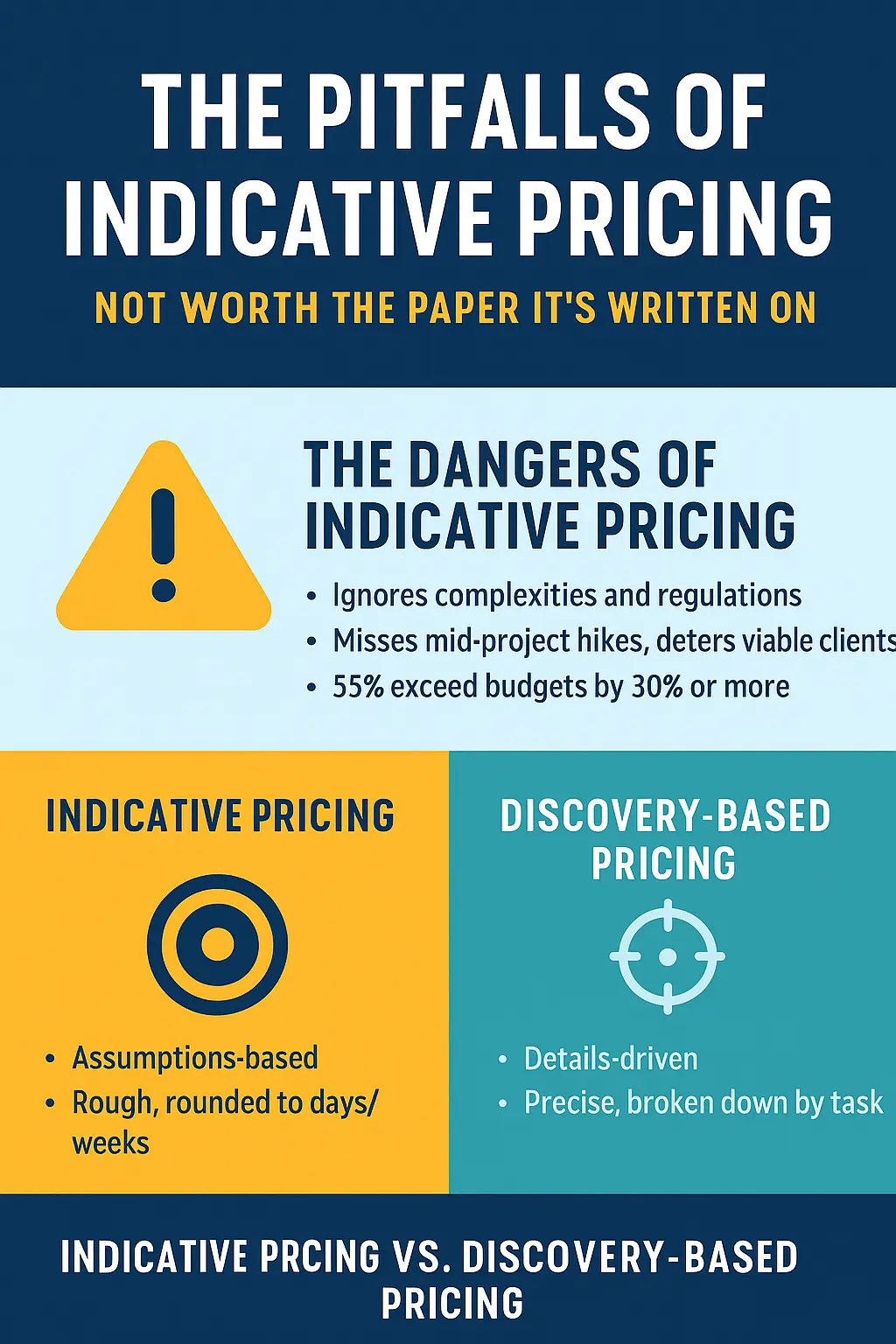
When evaluating custom software partners in Sydney, beware of indicative pricing—those quick, ballpark figures provided without deep analysis. They appear helpful but are often misleading and not worth the paper they're written on. At C9, we emphasise that true pricing emerges only after discovery, ensuring accuracy and trust.
The Dangers of Indicative Pricing
Indicative quotes rely on superficial details, ignoring complexities like your tech ecosystem or regulatory nuances. This leads to underestimation (causing mid-project hikes) or overestimation (deterring viable clients). A 2023 Forrester study found that 55% of software projects with hasty estimates exceed budgets by 30%. In Sydney, where finance and retail face unique local challenges (e.g., GST compliance or supply chain logistics), skipping discovery amplifies these risks, eroding confidence and wasting resources.
Indicative Pricing vs. Discovery-Based Pricing: A Clear Comparison
Indicative Pricing: Based on assumptions, it's rough and rounded to the nearest day, week, or even month. It's like estimating a Sydney Harbour Bridge repair without surveying the structure—prone to massive errors.
Discovery-Based Pricing: Grounded in detailed insights, it's precise to the nearest hour, with breakdowns by task and stage. This transparency builds reliability, focusing on value rather than guesses.
Real-World Example with Calculation
Consider a Sydney retail executive seeking a custom inventory app for omnichannel sales.
Indicative Pricing Approach: Without discovery, a developer assumes "medium complexity" and quotes 50,000-70,000 (rounded to the nearest week at 10,000 per week for 5-7 weeks). But hidden needs, like integrating with Australia Post APIs, add 2 weeks, pushing costs to 90,000. The initial quote proves worthless, leading to disputes and delays—no early ROI, just frustration.
Discovery-Based Pricing Approach: After a 45-minute call, we pinpoint requirements: Stage 1 MVP (120 hours at 150/hour = 18,000, delivering immediate stock efficiency). Savings from 20% reduced waste fund Stage 2 (80 hours = 12,000 for advanced analytics). Total: 30,000, with precise staging ensuring early ROI and scalable improvements.
This illustrates why discovery before pricing is vital: It enables staged development, turns savings into growth fuel, and avoids the pitfalls of vague estimates. At C9, we never quote without it—it's how we deliver exceptional results for Sydney businesses.
Conclusion
Sydney's business owners and executives are wisely switching to custom software development for its superior cost savings, scalability, and tailored fit in sectors like finance and retail. Fuelled by the innovation of hubs like Stone & Chalk, this shift empowers organisations to thrive in Australia's competitive landscape. By embracing discovery calls, staging projects, and avoiding indicative pricing traps, you position your business for sustained success. As Australia's leading custom software, apps, integration, and database developer, C9 is committed to guiding you every step of the way.
Ready to transform your Sydney operations with custom software? Don't skip discovery—schedule a free, no-obligation call with C9 today. Our experts will help craft a scalable solution tailored to your needs. Visit C9's website or contact us to start. Let's build the future of your business together!